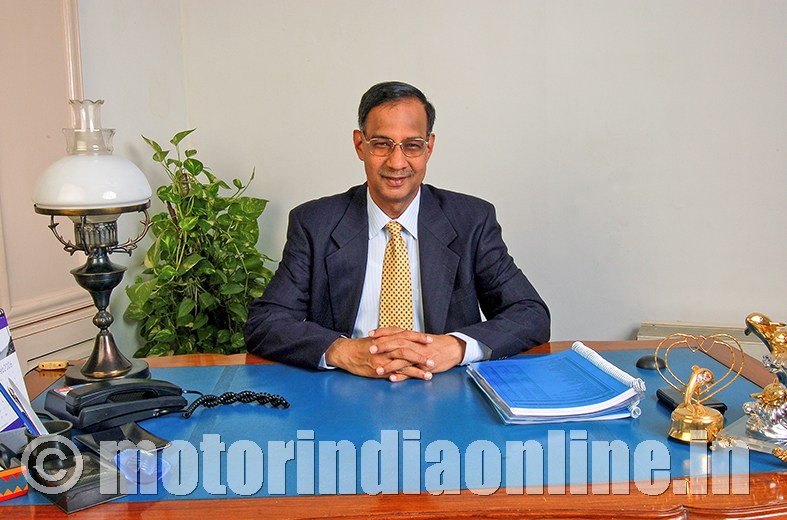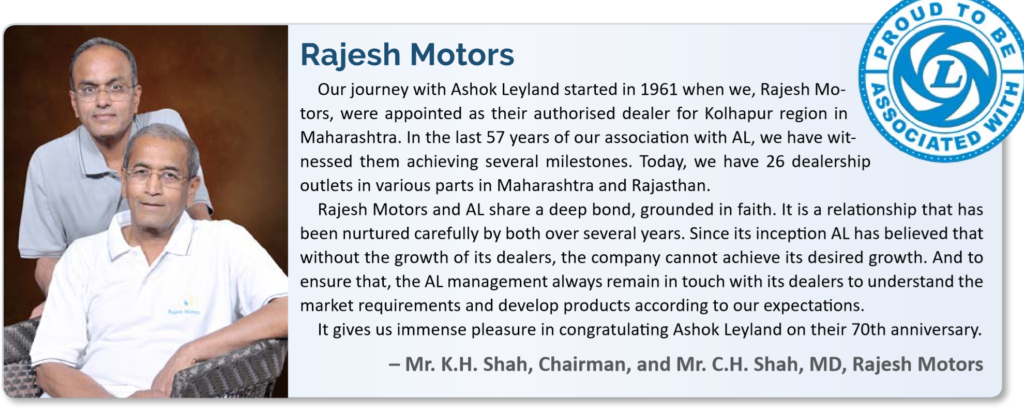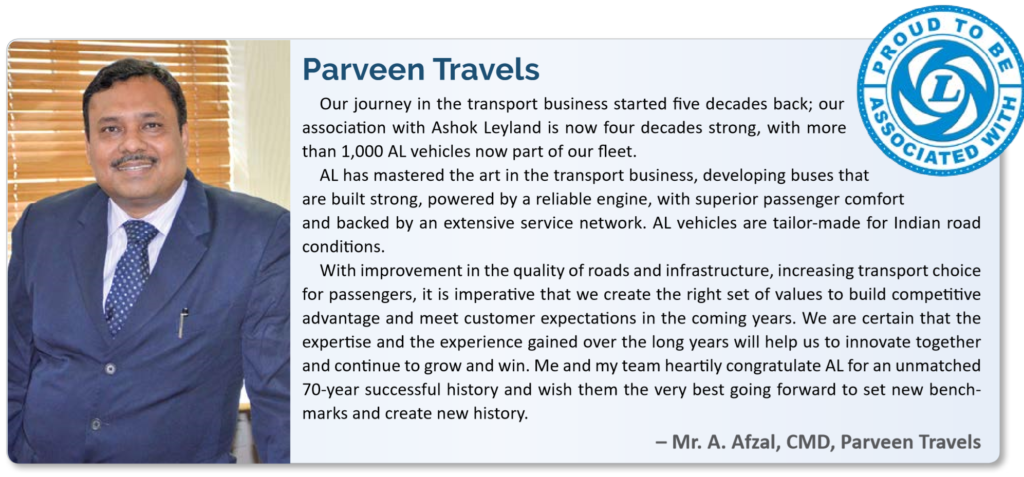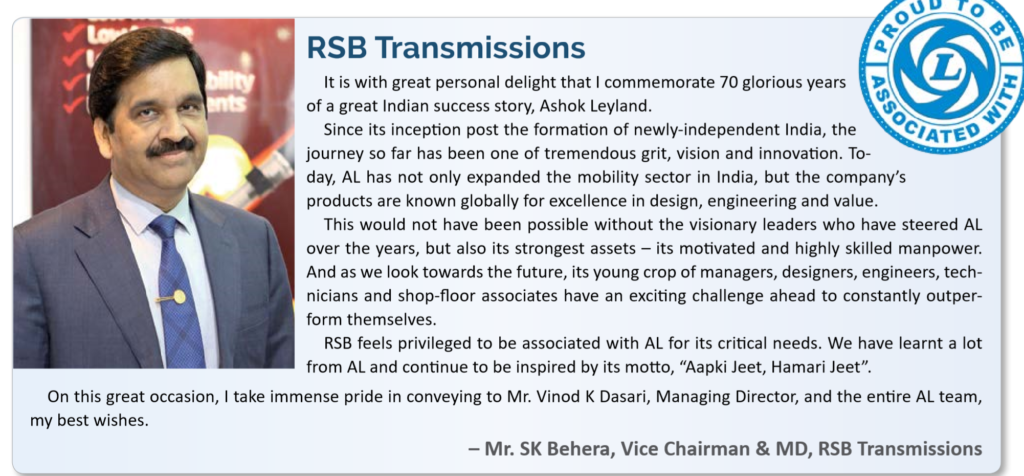Mr. R. Seshasayee was associated with Ashok Leyland for over 40 years, serving as its Managing Director for 13 years from 1998 to 2011. During his period as MD, the company embarked on a massive expansion and transformation phase, coming out with outstanding products that epitomized Indian innovation. We are delighted to present you Mr. Seshasayee’s views on the occasion of AL’s 70th anniversary.

Excerpts:
Ashok Leyland completes 70 years this year. Having been an integral part of the company’s growth and at the helm in the years of its progress and evolution, how would you describe your time at AL? What emotion does the 70-year milestone for the company you headed for many years invoke in you?
I should mention a happy coincidence: Ashok Leyland and I were born in the same year! Out of 70 years of our existence, we have spent over 40 years together, more than I have spent with my wife!
This long association has been my privilege, my pride. We have quite naturally influenced each other, but of course, AL’s influence on me, and my learnings from this wonderful institution, would far outweigh whatever little influence I might have had on the course of its history and growth.
Since AL and India, as a free nation, also share almost the same age and years, the economic and industrial history of India have no doubt had an indelible impact on the history of AL, marking its highs and lows, and I think it is fair to say that AL also contributed to the positive chapters of India’s, and in particular, Tamil Nadu’s auto industrial history.
You had headed AL during a crucial period in its history. What were the challenges that the company faced during your tenure as Managing Director and what were the defining moments?
I can almost write a book! Well, the company faced many challenges in its chequered history and most of these, I considered my own challenges, whether or not I was the Managing Director. I say this because, within five years of my joining AL as a Manager in the Internal Audit department, I was named Finance Director under the leadership of Mr. Ram Shahaney and I was an integral part of the leadership team for 35 years.
Let me mention a few major turning points in the recent history of the company.
First was the decision to be self-reliant in technology. For decades AL was the pioneer in technology innovations, but these were mostly on account of the access we had initially to British Leyland, and later to IVECO, who were joint shareholders with the Hindujas. It was very clear to me that continuing to be tied down to foreign technology will eventually render AL uncompetitive.
Although the Hindujas were initially skeptical, justifiably so, they took the risk and supported me build a strong engineering team and a state-of-art Technology Center, in a relatively short period of time. That launched on a course marked by self-confidence and technological self-reliance. Eventually, the Hindujas bought out IVECO.
AL can now see eyeball to eyeball every CV manufacturer in the world, on their technology capabilities.
Second was the series of agreements we concluded with the Trade Unions on productivity, while working on a vigorous engagement agenda with shop floor employees. This might not sound a big deal now. But, AL, like many other companies those days, had a long history of confrontation with the Unions.
There used to be hundreds of daily work stoppages in a year, and there was complete lack of trust between labour and management. We put in place several employment engagement initiatives, and I would personally meet all the employees of the company every quarter, communicating to them the challenges facing the company and seeking their inputs. This was a tortuous journey, but critical.
Third, the decision to establish the factory at Pant Nagar in the North and a bus plant in Ras al Khaimah in the UAE. Both signalled our resolve to go beyond being a South Indian company to a pan-India and a global company. This ushered in a mindset change.
Fourth, and the most important was the decision to bring in a lot of young talent from outside in leadership positions. I would visit Detroit often to systematically hunt for engineering talent. I am proud that the present leadership team, most of whom I had the privilege of recruiting, is doing such an outstanding job today.
None of the turning points I mentioned would have been successful manoeuvres had they not been sustained and improved upon by the successor team.
In all these moments in history, I must mention the extraordinary and visionary support that I received from the Hindujas, but for which the company could not have grown to be a successful enterprise.
Many in the CV industry consider AL as one of the best when it comes to Indian innovation that has often reflected in path-breaking products, first-time technologies and an attitude that has seen the company take a unique path when compared to the rest. In your view, what are the aspects the company/brand ‘Ashok Leyland’ stands out for the most?
What were the factors that kept the company growing despite challenges from competition and fluctuating market conditions?
I think our unremitting focus on technology has been the key. We always had a good reputation for robust, reliable products. Although AL and Tata Motors started life at about the same time, AL suffered until the nineties with lower licensed production capacity since it was a foreign company. AL had to therefore cede ground to Tata Motors in the Northern and Eastern markets for nearly 40 years.
Customers in the North would always say ‘your vehicle is very good, but spares and finance availability is inadequate, that is why, we have to buy competitor vehicles’.
In the CV industry, unless you have 15% to 20% market share in a truck center, spares and finance availability or resale price don’t come up to reasonable levels. It was particularly difficult those days when customers would go in for non-OE parts, in fact spurious parts.
But we overcame these struggles, because of our unwavering commitment to product innovation and product reliability, as well as customer focus. These attributes, I believe, essentially define the Ashok Leyland brand.
There has also been this ‘we can’ attitude. That’s the attitude that enables the company to kick dust in the eyes of the Goliaths of the industry. I remember that, in 2007, the CEO of the Indian operations of a European auto behemoth, who had just entered India, sympathetically told me that I would be facing challenging times as AL would not be able to withstand competition and would eventually perish. Happily, the tables are turned!
When the conventional Western wisdom cautioned us against the use of in line pump for higher emission standards, we not only said ‘we can’ but went on to deliver a superior product.
There is a certain audacity in this attitude, and I think this is essential to compete with the big boys.
Please share your views on the future of the Indian CV industry and where you see AL standing in the long run, say, by 2025/2030, both from a domestic market perspective and also in the global arena.
I think the auto industry has entered a new, exciting phase marked by a magnitudinal change in vehicle automation, digitization of services and alternate fuels. The winner will be the one who gets two things right: one, the capacity to introduce new paradigms, surround and capture the customer with superior value, and two, accurate timing of introducing changes, especially in technology.
I believe AL is on the right track on both these. If AL remains paranoid about potential disruptions and maintains agility to innovate and execute, there is no doubt it will remain in the top global league of CV manufacturers.
I don’t expect AL to have significant presence in Western markets unless the shareholders take the risk of major acquisitions. But there is every hope that the company will dominate the ‘second world’ markets.